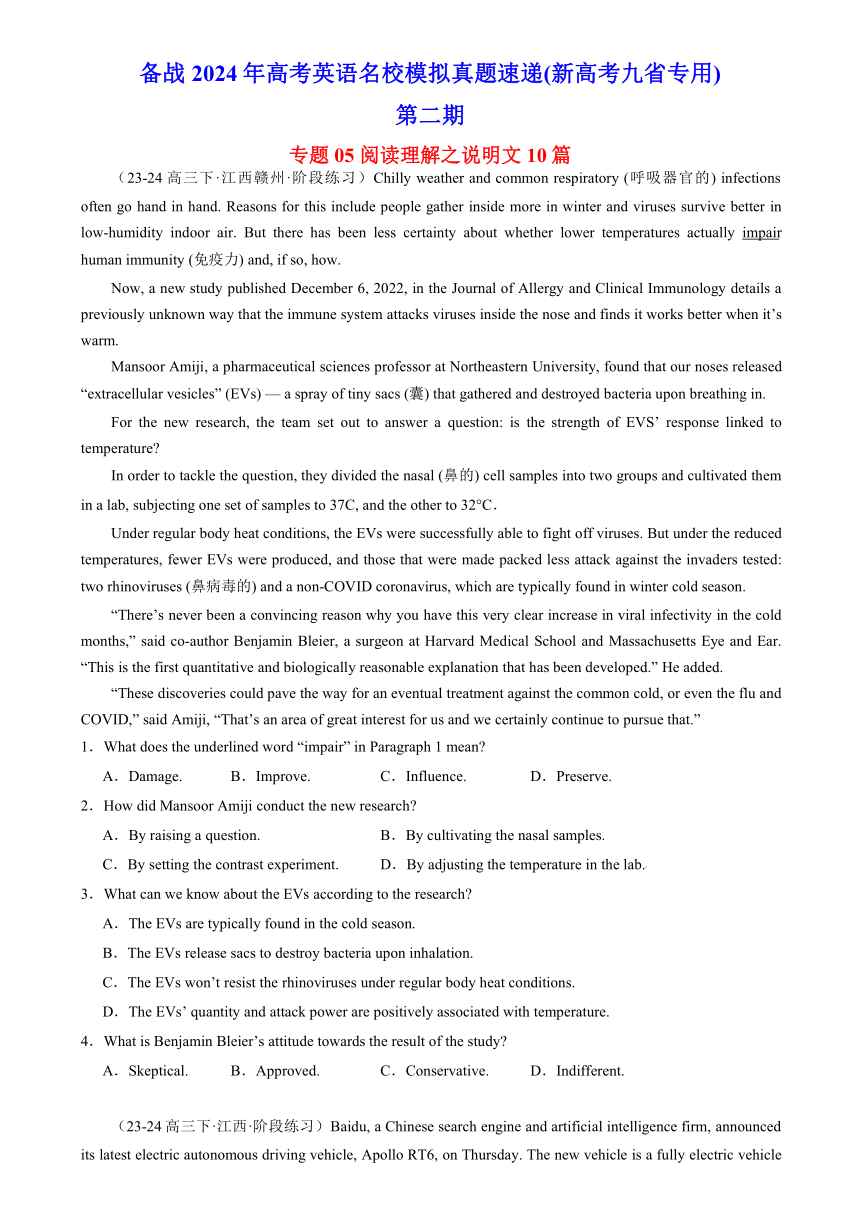
备战2024年高考英语名校模拟真题速递(新高考九省专用) 第二期 专题05 阅读理解之说明文10篇 (23-24高三下·江西赣州·阶段练习)Chilly weather and common respiratory (呼吸器官的) infections often go hand in hand. Reasons for this include people gather inside more in winter and viruses survive better in low-humidity indoor air. But there has been less certainty about whether lower temperatures actually impair human immunity (免疫力) and, if so, how. Now, a new study published December 6, 2022, in the Journal of Allergy and Clinical Immunology details a previously unknown way that the immune system attacks viruses inside the nose and finds it works better when it’s warm. Mansoor Amiji, a pharmaceutical sciences professor at Northeastern University, found that our noses released “extracellular vesicles” (EVs) — a spray of tiny sacs (囊) that gathered and destroyed bacteria upon breathing in. For the new research, the team set out to answer a question: is the strength of EVS’ response linked to temperature In order to tackle the question, they divided the nasal (鼻的) cell samples into two groups and cultivated them in a lab, subjecting one set of samples to 37C, and the other to 32°C. Under regular body heat conditions, the EVs were successfully able to fight off viruses. But under the reduced temperatures, fewer EVs were produced, and those that were made packed less attack against the invaders tested: two rhinoviruses (鼻病毒的) and a non-COVID coronavirus, which are typically found in winter cold season. “There’s never been a convincing reason why you have this very clear increase in viral infectivity in the cold months,” said co-author Benjamin Bleier, a surgeon at Harvard Medical School and Massachusetts Eye and Ear. “This is the first quantitative and biologically reasonable explanation that has been developed.” He added. “These discoveries could pave the way for an eventual treatment against the common cold, or even the flu and COVID,” said Amiji, “That’s an area of great interest for us and we certainly continue to pursue that.” 1.What does the underlined word “impair” in Paragraph 1 mean A.Damage. B.Improve. C.Influence. D.Preserve. 2.How did Mansoor Amiji conduct the new research A.By raising a question. B.By cultivating the nasal samples. C.By setting the contrast experiment. D.By adjusting the temperature in the lab. 3.What can we know about the EVs according to the research A.The EVs are typically found in the cold season. B.The EVs release sacs to destroy bacteria upon inhalation. C.The EVs won’t resist the rhinoviruses under regular body heat conditions. D.The EVs’ quantity and attack power are positively associated with temperature. 4.What is Benjamin Bleier’s attitude towards the result of the study A.Skeptical. B.Approved. C.Conservative. D.Indifferent. (23-24高三下·江西·阶段练习)Baidu, a Chinese search engine and artificial intelligence firm, announced its latest electric autonomous driving v ... ...
~~ 您好,已阅读到文档的结尾了 ~~

